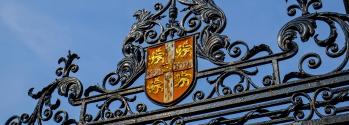
Careers
Whatever interests you pursue and develop, our degree will refine your existing skills and build new ones, making you an informed and intelligent analyst of complex evidence, as well as a critical thinker, and an articulate presenter and writer of your ideas. These are skills highly valued by employers, opening the way to many careers as a graduate.
The undergraduate single honours Archaeology course at the University of Cambridge is among the most recent academic programmes to receive formal accreditation from the Chartered Institute for Archaeologists (CIfA) and University Archaeology UK (UAUK).
Accreditation recognises degree programmes that provide skills relevant to a career in the historic environment.
While about half of our graduates go on to archaeological careers or postgraduate study, many go on to careers in sectors as varied as media, commerce, diplomacy, advertising, museums, conservation and health, and others.
The Careers Service works closely with students to help them access job and work experience opportunities. It offers careers and employability events, employer workshops and presentations, skills programmes and tailored individual careers guidance.
Specific Archaeology Employment: Commercial field units & consultancies; Museums & Heritage Management; Local Government; Academic sphere; National Heritage bodies (e.g. Inspectors of Ancient Monuments, field workers, Climate Change Managers); The National Trust, Churches Conservation Trust, Society for the Protection of Ancient Buildings; National Finds Advisors, Portable Antiquities Scheme.
Beyond Archaeology: The City; Business Management & Administration; Education (all levels, many subjects); Marketing and Advertising; Small and Medium Enterprises; Armed Forces; International charities; Conservation; Ecological and Environmental spheres (e.g. environmental impact assessments); Forensics (inc. International War Crime investigation); Publishing and journalism; Media production and research; Law.
Skills you’ll learn in your degree
Studying with us allows you to develop a wide-ranging portfolio of skills that are valued by employers around the world:
- Team work
- Evidence evaluation, advocacy and debate
- Project Management
- Planning and Budgeting
- Use of quantitative and qualitative data
- Oral, written and visual presentation
- Public engagement
- Scientific lab work
- Health and Safety awareness
- Geography and landscape analysis
- Sampling techniques and strategies
- Interpretation of maps and satellite imagery
- In-depth knowledge of world history, culture and religion
What former students say
"My degree gave me a solid foundation in archaeological knowledge, thought and theory. But the research, time management and writing skill sets I gained along the way are in some ways more valuable in post-graduation life, and have already helped me in producing several commercial archaeological reports as part of my current job. Being involved in college and university-level access work has helped me work towards being involved in outreach and community work and started to equip me with the skill set to do so."
Nina O'Hare, BA 2015, Worcestershire County Council Read more about Nina's story in Cambridge University News
“My Archaeology degree equipped me with invaluable skills in critical thinking, puzzle solving, and effective writing. I also enjoyed experiences that Cambridge offered me—digging with the Cambridge Archaeological Unit on the Late Bronze Age site of Must Farm, excavating with Colin Renfrew on an islet in the Aegean Sea, artefact handling, and working in various laboratories. Currently I am pursuing an MSc in Bioarchaeology. I am involved in a joint project on dairying and working on how fermentation alters the stable carbon isotope values of major fatty acids. I am also on the editorial board of The Post Hole journal and in the process of publishing my undergraduate dissertation. The Cambridge education prepared me for further archaeological research.”
Yun Chiang BA 2018


